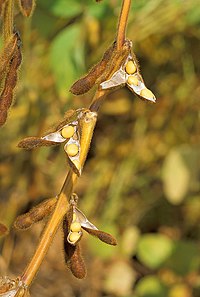
Photo from wikipedia
Abstract Coumarins possess a wide array of therapeutic capabilities, but often with unclear mechanism of action. We tested a small library of 18 coumarin derivatives against human invasive breast ductal… Click to show full abstract
Abstract Coumarins possess a wide array of therapeutic capabilities, but often with unclear mechanism of action. We tested a small library of 18 coumarin derivatives against human invasive breast ductal carcinoma cells with the capacity of each compound to inhibit cell proliferation scored, and the most potent coumarin analogues selected for further studies. Interestingly, the presence of two prenyloxy groups (5,7-diprenyloxy-4-methyl-coumarin, 4g ) or the presence of octyloxy substituent (coumarin 4d ) was found to increase the potency of compounds in breast cancer cells, but not against healthy human fibroblasts. The activity of potent compounds on breast cancer cells cultured more similarly to the conditions of the tumour microenvironment was also investigated, and increased toxicity was observed. Results suggest that tested coumarin derivatives could potentially reduce the growth of tumour mass. Moreover, their use as (combination) therapy in cancer treatment might have the potential of causing limited side effects. Graphic abstract
Journal Title: Molecular Diversity
Year Published: 2020
Link to full text (if available)
Share on Social Media: Sign Up to like & get
recommendations!